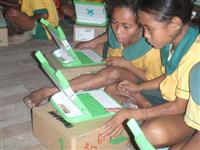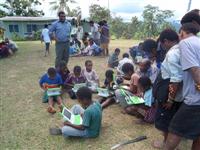Around our article on OLPC Oceania's concept paper we had a chance to conduct an e-mail interview with Ian Thomson, OLPC/RICS Coordinator, Secretariat of the Pacific Community, and Michael Hutak, OLPC Director, Oceania.
Since the resulting questions and answers turned out to be quite extensive we have decided to split it into two parts, you can find the first half below with the second one following tomorrow.
One Laptop per Pacific Child, that would be roughly 1.7 million children, by 2015: Is that goal even remotely attainable?
MICHAEL HUTAK: It's an aspirational goal that mirrors the Millennium Development Goals, and specifically MDG2: "to ensure that, by 2015, children everywhere, boys and girls alike, will be able to complete a full course of primary schooling."
We want to contribute to this wider international effort, this greater human development goal, indeed we see the XO specifically as a catalyst for reaching MDG2. But you'd be surprised what coordinated international cooperation can achieve. It's not widely sung from the mountain top, but in the late 1980s UNICEF and Rotary decided to work together to eradicate polio, by 2005 they had achieved a 99% success. We want to take a similar approach, using the XO to inoculate today's six year olds from the disadvantage that lack of primary education bestows upon a child for the rest of their productive life. So yes, it is remotely possible. We just need to dedicate ourselves to achieving it and start working together to do it.
There seem to be 9 pilots and trial-deployments underway in the Pacific, could you tell our readers a little more about where these are happening, when they started, what progress has been made so far, etc.
IAN THOMSON: We have started projects in 5 countries (8 schools and one NGO). The Solomons is most advanced as they started with B2 machines. The only way to get between the schools is by canoe as they are all inside a beautiful lagoon. We have seen various photos of XOs in the hands of school children riding horses, balancing on heads and walking up steep hills. In the Solomons, they take their XO home in the dugout canoe.
In Papua New Guinea, we started with the Grade 3 students (6 year olds) and they are very keen to complete a laptop to every student. The Government is gearing up for a big OLPC program with support from the NGO sector, especially the church run school system.
Nauru's Ministry of Education has fully adopted OLPC and are quite advanced at integrating it into their Rich Task based education system.
The NGO in Vanuatu is a small project to test how to reach children who don't go to school (about 40% of children in Papua New Guinea, Vanuatu and Solomons don't attend school). We want to reach those children as well.
The deployment in Niue created a lot of press, what are the results so far from every child on the island having a connected laptop?
IT: It is still a bit early to see any results from the project. They have allocated a laptop to every child in their education system, including early childhood through to final year at high school. We are very keen to see the results, but so far, we have the usual child enthusiasm and teacher support.
One interesting development was relating to music. The students have been banned from bringing MP3 players to school, so they found out how to download an MP3 player onto the XO and now they have their music in school. (Introducing a challenge to the teachers).
MH: Niue's isolation and small population mean it is tantamount to a hermetically-sealed environment, and thus offers special opportunities to watch and learn. Because it straddles from early childhood to secondary school it is a unique deployment for OLPC, and we will be able over time to draw some wider conclusions that go beyond the obvious implications for the Pacific context. We are obviously very keen to make sure we capture any discernible results and draw on any lessons there to be learned.
How much would "One Laptop per Pacific Child" cost, based on what TCO / child / year?
IT: One key factor here will be power and there is such a variation in availability and cost that it is very hard to give a TCO figure. In fact, that is one of the outcomes we are expecting from the pilots.
MH: That's exactly right, a crucial part of the work during the pilot phase is to arrive at accurate figures so that we know exactly what resources each country will need to mobilise to first conduct trials, second move to scale up, and third achieve sustainability within the education sector. So these figures are currently unknown, but they are also literally 'academic', inasmuch as we need some really robust economic modelling that considers deploying the XO in a country within a whole-of-education sector and a whole-of-economy analysis. In other words we need to develop costings that don't just focus on the obvious outlays of buying and deploying computers and training teachers and so on, but that also identify what the XO will save countries within existing education budgets (through things like digitisation of curricula). We also need to put a price on forgone economic growth and lost long-term productivity that would result from NOT giving this generation of kids access to technology like the XO.
Who will pay for such an extensive and expensive program, especially in some of the LDCs such as Solomon Islands and Papua New Guinea? (esp. considering the follwing quote from the OLPC Oceania Concept: "SPC [Secretariat of the Pacific Community] urgently needs resources to build capacity to meet demands and extend trials to all PIF [Pacific Islands Forum] member states.")
MH: As well as being an effort to bring new learning opportunities to the world's poorest children, OLPC has often been identified as a "Base of the Pyramid" initiative which aims to help poor and developing countries by acting as a catalyst for economic development, helping to reduce vulnerability, stimulate local markets and safeguard livelihoods. All of this is within the realm of international development, therefore to answer your question, we are taking a region-wide approach and are looking to the traditional donors in the region for financial support: the international development banks, the UN, the EU, which has a strong presence throughout the Pacific, and the development agencies of the major donor countries such as Japan, Australia and New Zealand. There is a lot of bilateral aid going into the Pacific, even China has discovered us, and they're pouring soft-power into the region in the form of loans, grants and infrastructure projects to the Pacific. So our approach is to tap into these international and regional funding streams while staying focused on deployment through national education systems. It has to be owned by both national governments and local communities if it's going to be sustainable.
Do you expect the majority of the children to receive one of the current XO-1 laptops or the planned XO-1.5 revision which is supposed to become available in early 2009?
IT: Our plan is to keep rolling out laptops as they are available. We will take what ever comes off the production line.
MH: That's another reason why we are taking a regional approach and why SPC are such a valuable partner: we can secure larger orders, big enough to cover several Pacific Island countries (PICs), and get them into the supply chain from the manufacturer.
What are your thoughts on the XO-2?
IT: Of course, it's great, but we have more immediate issues to deal with right now. Saw it at the launch, was suitably impressed and can't wait until it is available.
MH: They will be a boon to the six-year-olds who eventually receive them, just as the XO-1 offers today's primary school kids immense opportunities. It's not like the inevitable supersession of a product tomorrow destroys the intrinsic utility of the product we have today. But as we say, today's kids, when they grow up, will be entering a world full of computational devices which are as yet unimagined; so it's really inspiring to see the brains trust in Boston not content to just rest on their laurels but instead actively creating a roadmap to our collective future. I'm imagining a future where today's kids tell their own children how much of a difference the XO-1 made to their lives.
The second half of this interview will be published over the coming days...




we are taking a region-wide approach and are looking to the traditional donors in the region for financial support: the international development banks, the UN, the EU, which has a strong presence throughout the Pacific, and the development agencies of the major donor countries such as Japan, Australia and New Zealand.
Alas, with the present world economic downturn, I am afraid there will be a lot less development money available.